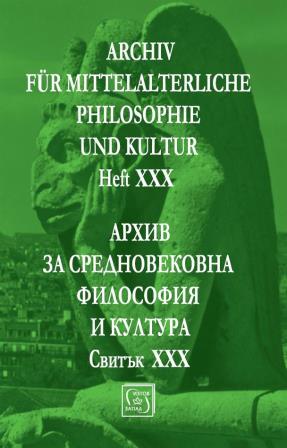Yet Another Episode from the Late Byzantine Reception of Thοmas Aquinas’ Summa Theologiae, IIa IIae: George Scholarios’ Critical Reception of Demetrios Cydones’ and Manuel II Palaiologos’ Views of the Fallibility of Religious Beliefs
Yet Another Episode from the Late Byzantine Reception of Thοmas Aquinas’ Summa Theologiae, IIa IIae: George Scholarios’ Critical Reception of Demetrios Cydones’ and Manuel II Palaiologos’ Views of the Fallibility of Religious Beliefs
Author(s): John A. DemetracopoulosSubject(s): Christian Theology and Religion, Philosophy, History of Philosophy, Theology and Religion, Comparative Studies of Religion, Philosophy of Middle Ages
Published by: Издателство »Изток-Запад«
Keywords: George Scholarios – Gennadios II; Manuel II Palaiologos; Demetrios Cydones; Thomas Aquinas; fallibility; religious faith
Summary/Abstract: George Scholarios – Gennadios II, in the introduction to his work De unica via ad salutem hominis (1455/56), acknowledges that “in this life, one person believes that the path to salvation he has chosen is the right one, while another believes a different path is correct, and a third believes in yet another. Each thinks that he alone is truly on the way to salvation, while all the others are mistaken or ignorant. However, it will be the future day that reveals the truth to all”. This scepticism derives from a similar position held by the Muslim interlocutor of Emperor Manuel II Palaiologos, as recorded in his work Dialogue with a Persian Muterizes, as well as from the views of Thomas Aquinas and Demetrios Cydones regarding the limits of human cognitive capacity, especially in the postlapsarian state. Manuel II, while drastically disagreeing with the position of Muterizes, accepts the limits of human cognitive power concerning the problems of Christian theology. Demetrios Cydones is considerably more optimistic than Manuel II about the power of lumen rationis to discover both dogmatic and religious truth, while Scholarios also holds an optimist view regarding the matter of dogmatic truth, provided that the theologian receives divine illumination. A common element in the views of these three Late Byzantine thinkers is that, in one way or another, they accept the fallibility of religious and dogmatic beliefs.
Journal: Архив за средновековна философия и култура
- Issue Year: 2024
- Issue No: 30
- Page Range: 217-246
- Page Count: 30
- Language: English
- Content File-PDF

